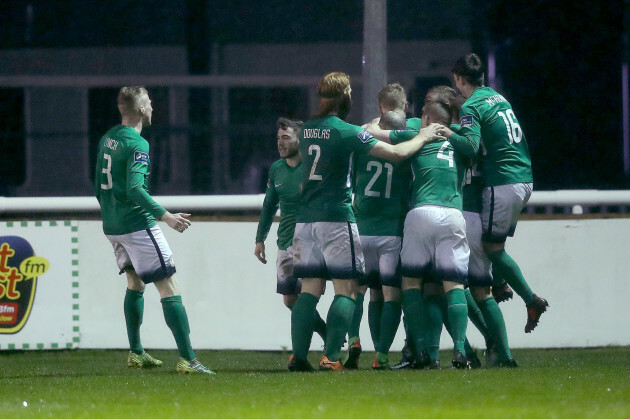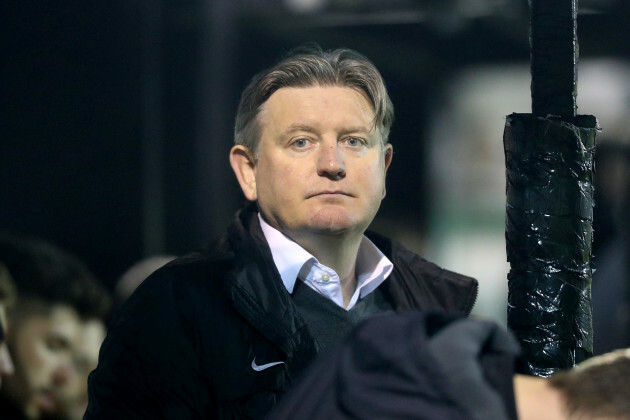Updated at 20.01
IT IS CLOSE to 20 years since Graham Kelly started coaching, but when he finally got the chance to manage in the League of Ireland, it was not the ideal scenario he might have hoped for.
The statement announcing his appointment did not try to hide the considerable challenge that lay ahead.
“We would like to thank Graham for taking on this difficult task at short notice,” the club said.
‘Difficult,’ if anything, seemed to be putting it mildly. Bray had just been beaten 5-0 by St Patrick’s Athletic in a game that led to Dave Mackey’s resignation as boss.
The struggling side’s overall record did not make for pleasant reading as far as followers of the club were concerned — a laudable 0-0 draw with Dundalk on the opening day was a rare positive, as the Seagulls lost the ensuing eight league games on the bounce.
Something had to change or relegation looked inevitable. In Kelly’s first game as caretaker, they lost 2-0 to Dundalk, but he was encouraged by the manner of the performance.
While they remain bottom of the league, five points behind ninth-placed Limerick, there have been signs of significant improvement in recent weeks. In addition to a 1-0 victory over Shamrock Rovers, they also overcame Derry City, who were on a 10-match unbeaten run at the time. Similarly, in their most recent match last Monday, they secured a draw at home to high-flying Waterford.
On Friday, they face another difficult fixture, travelling to Turner’s Cross to play Cork City. They will be underdogs once again, of course, but Kelly’s men have shown an ability to take points off some of the best sides in the league already this season.
Kelly says improving the club’s low morale was the first challenge he faced while a change of approach is seemingly paying dividends.
“They had a style of play, for whatever reason, it worked really well in [the 0-0 draw with] Dundalk and it didn’t really work after that,” he tells The42.
We just sort of went for it against Dundalk at home. We just said we’d get the ball down and play, we’d go at them. We probably had nothing to lose at that stage, because we hadn’t won a game, so we just changed our style a little bit. We wanted to keep the ball better, because we hadn’t been keeping it, and we wanted to try to get at teams — put them under a little bit of pressure rather than sit back and let teams come at us.
“If you look at the players and the squad, they have a lot of good footballers in there. So we’re well capable of playing ball and keeping it, and we’ve shown that over the last five weeks. Although we haven’t got the results, we’ve picked up seven points [since I've taken over], which has been a bonus obviously, but we’ve played some really good stuff at times. And once you’re playing, it gives the players a bit of confidence. The more touches on the ball in a game, players grow in confidence.
“It’s easy for a team bottom of the league to sit in and play long balls and play off second balls. We just decided ‘no, that’s not what we’re going to do’.
“You look at the squad from last year and I know there have been a lot of changes, but they played some really good football.
“But we still have really experienced players there like Conor Kenna, Gary McCabe, Aaron Greene, John Sullivan — lads that have been around a long time and they know what it takes to get the ball down and play.”
It always looked like it was going to be a difficult season for Bray. Despite a relatively solid sixth-place finish last season, it was a turbulent campaign. At one point, there seemed to be doubts about the club’s future and uncertainty over their players’ pay, but as Kelly points out, “no one was ever not paid”. And partially because of these financial issues, important players such as Dylan Connolly, Ryan Brennan and Keith Buckley have left over the past 12 months.
It also clearly impacted on the side’s 2017 season, as having started off challenging for a top-three spot, a significant dip of form meant they had to be content finishing lower down the table, though Kelly says there has been no similar off-the-field problems this season.
The 40-year-old coach admits he was somewhat taken aback by being given the chance to manage Bray, but is “really enjoying” the experience so far.
He has been working as a coach in some capacity since the age of 22, playing Leinster Senior League football as a youngster before deciding his strengths were best suited to the analytical side of the club at St Joseph’s Boys — the team he had a 21-year association with.
I was 22 and I just had a young son, I wasn’t going to do both [play and coach], so I just decided to go down the coaching route,” he explains.
Kelly worked with a number of future League of Ireland stars at Joeys, including Dan Casey and Dylan Watts (both currently at Bohemians), Aaron Dobbs (on loan at Wexford from Shamrock Rovers) as well as Darragh Noone and Dan McKenna (who are now part of Bray’s squad).
He garnered a good reputation during that period, as Kelly was named FAI Coach of the Year in 2013, while also helping his side secure a Kennedy Cup (a prestigious underage competition featuring teams from across the country) triumph while working alongside manager Martin Doyle (who is now on the coaching staff at St Patrick’s Athletic).
In 2015, Kelly ended his long association with St Joseph’s Boys, as Trevor Croly brought him in to be U17s coach at Bray. He has worked at the club in a variety of roles since then, before being appointed caretaker last month.
The club’s experienced defender Conor Kenna has been helping out on the coaching side too, with former UCD and Limerick boss Martin Russell coming on board in an advisory capacity.
While holding a Uefa A and B coaching license, Kelly does not have the pro license necessary to be a permanent manager. Uefa rules dictate that he can remain in charge for a maximum of 60 days, which means he will have to step aside from his role at the beginning of next month at the latest.
Kelly says he is unsure what will happen thereafter, although a number of reports have indicated Russell is set to fill the soon-to-be-vacant position.
And while the current coach is optimistic the side have the capability to succeed in their battle against relegation, he is under no illusion as to the difficulty of the task.
As it stands, Bray do not have the support or resources comparable to the top sides in the league.
“I think there are 300 or 400 odd people coming to the games at the moment, and that’s when we’re playing really good sides like Waterford and Derry.
I remember last year, we played Cork, we were second, they were top and I think there was only 1000 people there. It’s not as if it’s just happened this year, because results have been bad. It’s an ongoing factor in Bray that they just don’t get the support. I’m not sure how we can [rectify] that. Can the club do more in the community? Can we engage the local business people to come in with us? Because definitely, it has a knock-on effect on everybody if people aren’t coming in to watch the games.”
The Seagulls are also at a significant disadvantage to a number of sides in the league, given that their squad are part-time.
While Gary McCabe last year told The42 that work on the side is not necessarily detrimental to a footballer’s performance, there is no doubt that professional teams such as Dundalk and Shamrock Rovers have the ideal conditions in which to thrive.
“The Monday night games are tough, because you’re back in work on Tuesday morning,” Kelly, who has a job with Vodafone in addition to his footballing commitments, adds. “And if it’s tough for me, you can imagine how tough it is on our players. They’re the ones that are playing for 95 odd minutes. Take next Monday, we travel to Derry. We probably won’t get home until 2.30 in the morning. And all our lads work.
“They’ve got to be up for work the next morning at seven o’clock. I’m lucky in Vodafone, we’ve a really good manager there, she’s really understanding. And she’s been great with me over the last couple of weeks.
“There are pros and cons to it… [The negative consequences are mostly] to do with, when you get back, the recovery. We’re trying to go in on the Tuesday evening, maybe do a pool session as recovery. Then you have Wednesday off and you’re back in Thursday preparing for Dundalk away. It’s really tough. Whereas if you’re a full-time team, obviously you have extra days to do more and prepare better.”
The42 is on Instagram! Tap the button below on your phone to follow us!



